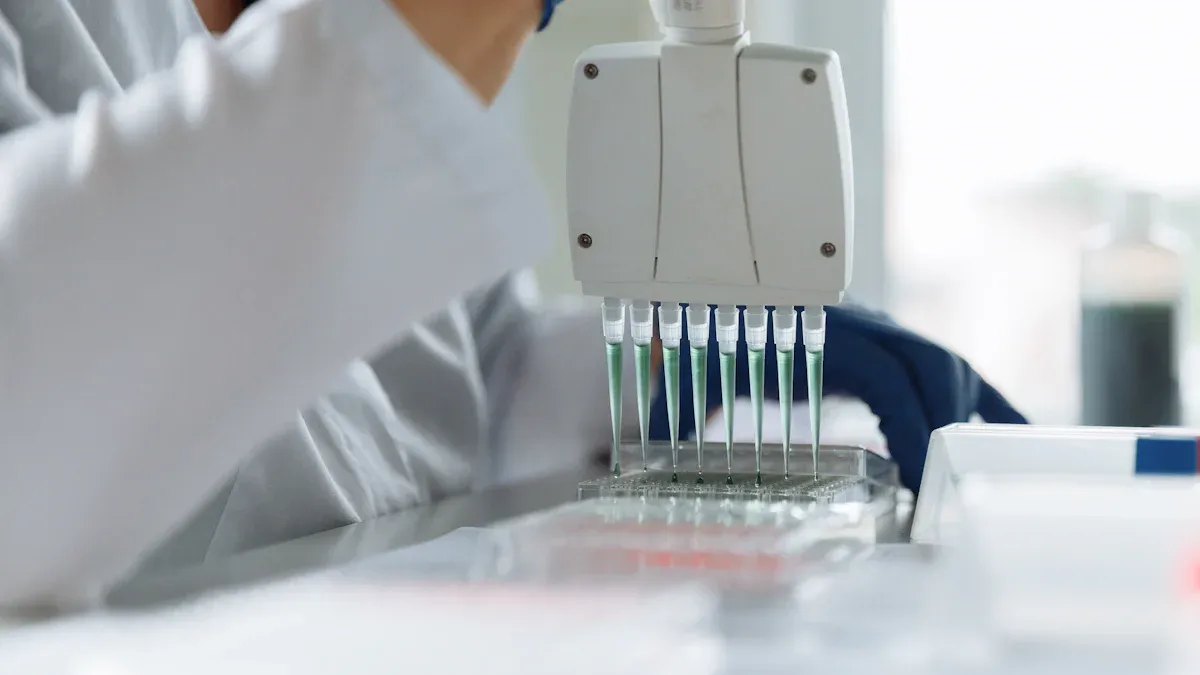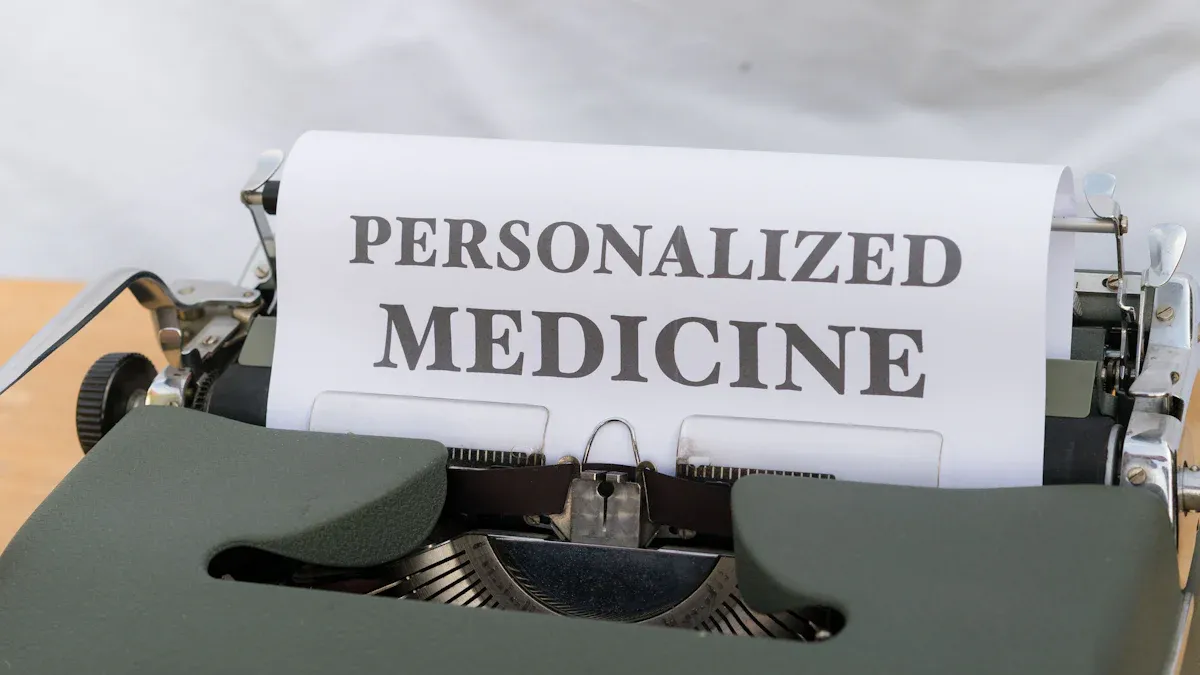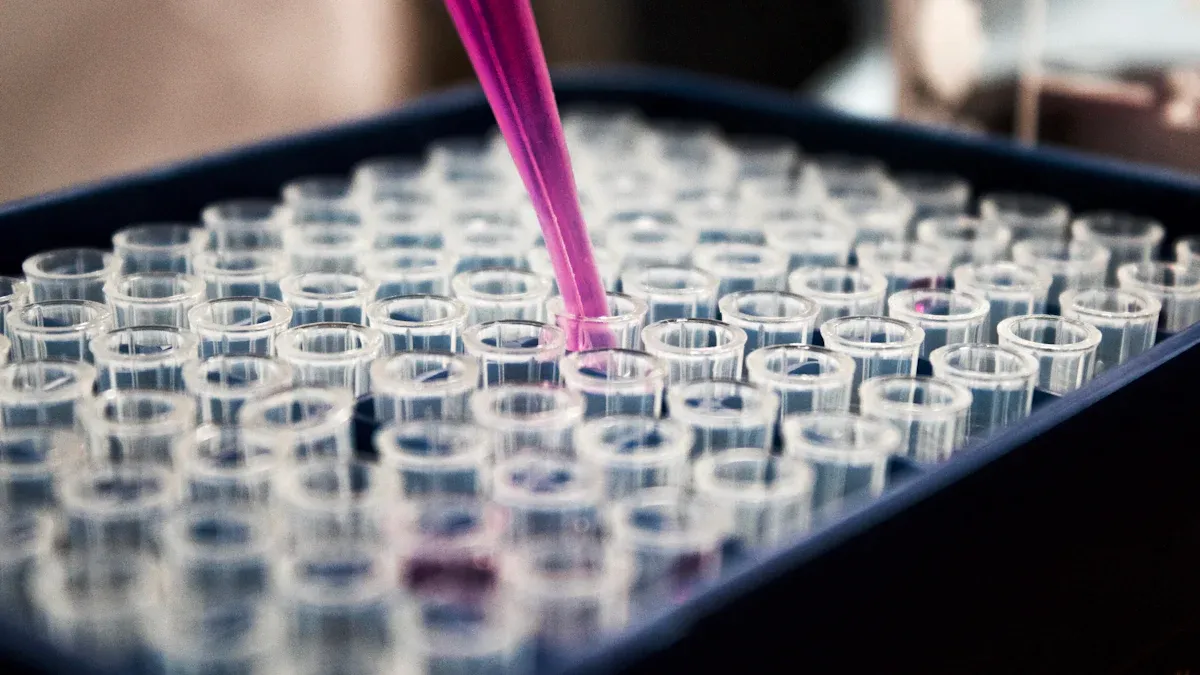
Imagine if your supplements were made just for you—using your DNA. That’s what AI supplement formulations can do. By studying your genetic data, AI finds the nutrients your body needs. This isn’t just easy; it’s a smarter way to stay healthy.
Here’s why this is important. The personalized nutrition market is growing fast. It’s expected to rise from $3.66 billion in 2024 to $10.5 billion by 2029. Why? Because people are seeing real changes. For example, a 42-week study showed users ate better and lost weight with DNA-based tips. These ideas are changing how we think about health.
Note: This article is for learning only and not medical advice. Always talk to a doctor for personal help.
Key Takeaways
AI uses your DNA to make custom supplement plans for you.
Custom nutrition helps stop health problems and makes you feel better.
DNA tests show how your body uses nutrients, helping you eat smarter.
AI changes your nutrition tips as your health changes over time.
Spending on custom nutrition can save money by avoiding big health issues.
Many companies now sell cheap DNA tests and custom supplements for everyone.
AI tools give quick updates and tips to help you stay healthy.
Learning about your genes through DNA tests helps you manage your health better.
Understanding Personalized Nutrition
Defining personalized nutrition
Personalized nutrition means creating a diet just for you. Instead of general advice, it’s based on your unique needs. It looks at things like your age, lifestyle, and DNA.
Why is this important? Many diets fail because they aren’t personal. Personalized nutrition focuses on what your body actually needs. For example, if your genes show low vitamin D absorption, your diet can include foods or supplements to help.
This isn’t only about eating better—it’s about staying healthy. Studies show early nutrition checks and custom diets prevent malnutrition and shorten hospital stays.
The role of genetic data in nutrition customization
Your DNA helps explain your body’s nutrition needs. It shows how you process nutrients, react to foods, and risks for deficiencies.
For example, some genes affect how you absorb iron or handle caffeine. Experts use this data to create a diet that fits you.
Why does this matter?
Malnutrition affects up to half of hospital patients, causing longer stays.
Custom diets improve health, lower risks, and save money.
Evidence Type | Description |
|---|---|
Malnutrition Statistics | 40-50% of hospital patients lack proper nutrition or are at risk. |
Complications Risk | Malnourished surgery patients face double the risk of problems. |
Hospital Stay Duration | Malnourished patients stay in hospitals 90% longer. |
Cost Implications | Malnutrition raises hospital costs to 75%, compared to 35% for healthy patients. |
Using DNA, personalized nutrition can solve these problems and keep you healthier.
How AI transforms the personalization process
AI makes personalized nutrition even better. It studies your DNA, lifestyle, and health history to create a perfect plan.
Think of AI as your smart nutrition coach. It combines DNA with other details, like gut health and habits. This helps AI give advice that changes with your needs.
What can AI do?
Suggest foods to improve gut health and reduce bloating.
Boost energy and mood with custom diet plans.
Offer affordable ways to manage health issues.
AI-based nutrition plans already work well. People report better digestion, fewer IBS symptoms, and stronger immunity. With AI, personalized nutrition becomes faster, smarter, and more helpful.
The Science Behind AI Supplement Formulations
What is nutrigenomics?
Ever wonder why some diets work for others but not you? That’s where nutrigenomics helps. It studies how your genes and food interact. Think of it as a link between your DNA and meals.
Nutrigenomics shows why your body needs certain nutrients more or less. For example, your genes might make it hard to absorb vitamin D or handle caffeine. Knowing this helps you choose better foods and supplements.
This science is growing quickly. Companies like Nestlé Health Science and Amway use genetic data to make custom supplement plans. They show how nutrigenomics turns science into real health solutions.
How genes affect nutrient needs
Your genes decide how your body uses nutrients. They control how you absorb vitamins and digest food. For example, a gene called TAS2R38 changes how some people taste bitter foods. If you have it, you might avoid bitter veggies, missing key nutrients.
Other genes cause bigger problems. A gene linked to hemochromatosis makes your body take in too much iron, which is harmful. Some people lack a gene needed to absorb vitamin B12, causing anemia. Vitamin D absorption can also differ greatly due to genetics.
These examples show why one diet doesn’t fit everyone. By studying your genes, you can learn what your body really needs.
How AI helps with supplement planning
AI makes understanding genetic data simple. Sorting through DNA details is hard, but AI does it fast. It checks your DNA, habits, and health goals to create a custom supplement plan.
AI tools use DNA tests and daily routines to suggest the right supplements. For instance, if your genes show poor vitamin D absorption, AI may recommend a higher dose.
This isn’t just an idea—it’s already working. The personalized nutrition market is growing fast, from $18.60 billion in 2025 to $72.18 billion by 2034. People trust AI because it works. It makes staying healthy and following nutrition plans easier.
Tip: Want to know your genetic needs? Try a DNA test. It’s a simple way to learn about your health and nutrition.
How AI and DNA Testing Work Together

The process of DNA testing for nutrition insights
DNA testing is the first step to a custom nutrition plan. It’s easier than it sounds. You provide a small sample, like saliva or a cheek swab. Labs study this sample to learn about your genes. Your genes show how your body uses nutrients, reacts to foods, and handles shortages.
For example, your DNA might show trouble absorbing vitamin D or sensitivity to caffeine. These details help experts know what your body needs to stay healthy. DNA testing also reveals risks for problems like obesity or diabetes. This gives you a chance to make changes early.
The best part? You don’t need to be a scientist to use this. Companies offering DNA-based supplements make it simple. One test can give you tons of health information.
AI algorithms for interpreting genetic data
After DNA testing, AI takes over. This is where the real work happens. AI studies your genetic data and turns it into useful advice. Think of AI as a smart helper that links your genes, habits, and health goals.
AI doesn’t just check your DNA. It also looks at your age, activity, and gut health. By combining this data, AI figures out what your body needs. Machine learning, a type of AI, helps by finding patterns in big data. This makes predictions about your nutrition more accurate.
For example, if your DNA shows poor iron absorption, AI may suggest iron-rich foods or supplements. It can even update advice as your health changes. Between 2014 and 2021, over 60 studies showed how machine learning improves nutrition plans. AI is changing how we stay healthy.
Developing personalized supplement recommendations
Once AI reviews your genetic data, it creates a custom supplement plan. This plan is made just for you, giving the right nutrients in the right amounts.
Here’s how it works. AI finds gaps in your nutrition using your DNA results. Then, it suggests supplements to fix those gaps. For example, if your DNA shows low vitamin B12 absorption, AI may recommend a higher dose. The goal is to give your body what it needs to work well.
What’s great is how flexible this process is. AI doesn’t stop with one plan. It updates as your needs change. If you start a new diet or face a health issue, AI adjusts your plan. This keeps your supplement advice helpful and up-to-date.
By mixing DNA testing with AI, you get a smart, personal solution. It’s not just about taking supplements—it’s about taking the right ones for you.
Practical Applications of AI-Powered Supplement Formulations
Examples of AI-driven supplement platforms
AI is changing how we think about nutrition. Some platforms now use advanced technology to make custom supplements for you. They mix AI with health data to create smarter solutions.
Here are ways AI is improving the supplement industry:
The AI market in food is growing fast, with a 44% yearly increase from 2019 to 2032.
AI tools can study food photos to guess your nutrition needs.
Platforms offer custom supplements and health tracking to help you stay healthy.
These tools make it simple to find the right supplements without guessing.
Example/Tool | What It Does |
|---|---|
AI with Health Apps | Looks at your data to suggest custom supplements. |
Voice Assistants | Helps you search for supplements using voice or pictures. |
Virtual Health Assistants | Gives advice based on your health checkups. |
User Reviews and Social Media | Uses feedback to make better products. |
Nosto’s Real-Time Analytics | Changes content to improve sales and user interest. |
Adobe Sensei | Studies customer likes for better shopping experiences. |
These examples show how AI is making health and nutrition easier for everyone.
Real-world success stories in personalized nutrition
Do these platforms really work? Yes, they do! Many companies are already using AI and DNA testing to get great results.
Company | What They Do | Key Features |
|---|---|---|
Habit | Combines DNA, blood tests, and lifestyle info for better nutrition. | Uses special algorithms for custom diet plans. |
Notable Labs | Uses genetics and AI for precise health advice. | Offers personal diet tips and health solutions. |
Investor Returns | Builds on strong tech and market growth. | Delivers high profits through constant innovation. |
These examples prove that personalized nutrition can improve health and inspire new ideas in the industry.
How consumers can access these services
Getting started with AI-powered nutrition is easy now. Companies make it simple to try DNA tests and custom supplement plans.
Here’s how you can use these services:
The personalized nutrition market could reach $11.5 billion by 2025, showing how popular it’s becoming.
Companies like Habit use DNA and blood tests to design custom diets.
Nestlé’s Wellness Ambassador program in Japan gives supplements to over 100,000 people.
Gatorade uses tech to track hydration and offer personal solutions.
In Singapore, Smartfuture has workplace kiosks for diet and fitness advice.
These services fit into your daily life, making health easier to manage. Whether you’re an athlete or just want to eat better, AI platforms have options for you.
Benefits of AI-Based DNA-Driven Supplement Formulations
Precision in meeting individual health needs
Imagine a health plan made just for you. That’s what personalized nutrition offers. By using your DNA and AI, you get advice that fits your body. This isn’t random guessing—it’s science helping you stay healthy.
For example, custom supplements can solve specific health problems. If you can’t absorb vitamin D or iron, your plan adjusts to fix it. People with Crohn’s or celiac disease often struggle with nutrients. Personalized plans make sure they get what they need. Vegans, who may lack vitamin B12, and older adults with deficiencies also benefit.
Here’s what research shows:
TruDiagnostic ran over 30 studies to reverse aging markers with diet.
Their tools, based on 15,000 patients, predict health needs accurately.
AI and epigenetics are changing how we approach health care.
Personalized nutrition doesn’t just help—it teaches you to make better choices for your body.
Convenience and efficiency in supplement planning
Planning supplements can feel confusing and time-consuming. With so many choices, how do you pick the right one? AI makes this easy by doing the hard work for you. No more hours of research or guessing.
AI platforms handle tasks like checking your health data and predicting needs. They also help companies manage stock better, so you get your supplements on time. This means no delays or running out of products.
Here’s how AI saves time:
Key Benefit | Description |
|---|---|
Handles boring tasks, letting teams focus on bigger goals. | |
Improved Inventory Forecasting | Predicts stock needs better, avoiding too much or too little supply. |
Personalized Customer Experiences | Uses your data to give you better service and advice. |
These tools make life simpler. Whether you’re busy or just want to stay on track, AI helps you stick to your health goals.
Long-term health and cost benefits
Personalized nutrition isn’t just about quick fixes. It’s a smart way to stay healthy and save money over time. By meeting your unique needs, it helps prevent serious health problems and boosts your well-being.
Studies prove this works. Personalized plans lead to better results than general advice. For example:
Study Description | Outcome |
|---|---|
Nutrition program for workers | Bigger drops in BMI, hip size, and cholesterol than general advice. |
Trial with overweight adults | More fat loss, lower BMI, and better blood markers after 12 weeks. |
Study on blood sugar levels | Smaller spikes in blood sugar after meals with DNA-based plans. |
Online programs also show great results. In a six-month study of 1,200 people, those using custom plans ate less red meat, reduced salt, and improved their diets. These changes improve health and cut medical costs over time.
Think of it like this: investing in personalized nutrition now saves you from costly treatments later. It’s good for your health and your wallet.
Challenges and Ethical Considerations
Privacy concerns with genetic data
Sharing your genetic data can feel risky. It’s like giving away personal secrets. Companies use your DNA to make custom supplement plans. While helpful, this raises questions about how your data is stored and used.
The more detailed the advice, the more data they need. This increases the chance of privacy problems. If your genetic info gets leaked, it could be misused. For example, it might lead to unfair treatment at work or with insurance.
A study shows better personalization means higher privacy risks.
Not all companies have strong security to protect your data.
You should feel safe using these services. Always check how a company handles your data before signing up.
Accessibility and affordability of personalized nutrition
Personalized nutrition is exciting, but not everyone can afford it. DNA tests and custom supplement plans cost a lot. Many people can’t pay for these services.
For example, a single DNA test can cost hundreds of dollars. Add the price of supplements, and it becomes too expensive for most people. This means only wealthier people can enjoy these benefits.
Access is also a problem. Some areas don’t offer these services. People in rural places or poorer communities may miss out on personalized nutrition.
To make this idea work for everyone, companies need to lower costs. They also need to expand services to reach more people.
The need for regulation and transparency in AI applications
AI is smart, but it’s not perfect. You need to know how AI makes decisions about your health. Without clear explanations, it’s hard to trust the advice.
AI systems can have biases. If the data used to train them isn’t diverse, the results might not fit everyone. This is a big issue in health care, where personal solutions are important.
AI in nutrition has great benefits but also challenges. Problems like bias and privacy risks need fixing.
Rules can help solve these issues. Governments should set standards for AI in health care. These rules should make sure AI is fair, accurate, and clear. You should know how your data is used and be able to ask questions.
Fixing these problems will make personalized nutrition safer and better for everyone.
The Future of AI and DNA in Personalized Nutrition

New trends in AI and genetic testing
AI and genetic testing are changing how we think about food. These tools are getting smarter and easier to use. AI can now study huge amounts of genetic data very quickly. This means you can get personal nutrition tips faster than ever.
One cool trend is AI predicting how your body reacts to food. Imagine knowing which meals give you energy or which snacks to skip to avoid bloating. AI can even check your gut health to give a full picture of your wellness. Genetic testing is also improving. It’s not just about spotting disease risks anymore. Now, it helps you make better daily choices.
Some companies mix wearable devices with AI and DNA data. These gadgets track your sleep, diet, and activity to give advice. For example, if you feel tired, an app might suggest a magnesium-rich snack based on your genes. These trends make personal nutrition easier and more useful for everyone.
Progress in nutrigenomics and supplement science
Nutrigenomics is growing fast and changing how we stay healthy. It studies how food and your genes work together, showing why some diets suit you better. New discoveries are making this science even stronger.
Evidence Type | Description |
|---|---|
AI in Nutrigenomics | AI finds helpful food ingredients faster, speeding up research. |
Nutrigenetic Relationships | Studies link genes to obesity, improving diet plans. |
Clinical Applications | Clinics use gene-based findings to improve health results. |
These advances aren’t just ideas—they’re helping people now. Personalized nutrition advice based on your genes is becoming common. In places like India, where diet-related illnesses are rising, nutrigenomics is helping solve these problems. By learning how your genes affect your nutrition, you can make smarter choices for better health.
How it could change global health
AI and DNA testing could improve health worldwide. Personalized nutrition might lower rates of diseases like diabetes and heart problems. By meeting your specific needs, it helps you stay healthy with the right nutrients.
This approach also saves money. Healthier people mean fewer doctor visits and lower medical costs. Imagine a world where fewer people need expensive treatments because they stay healthy with personal nutrition. It’s not just about helping individuals—it’s about building a healthier society.
Globally, these tools could fight malnutrition in poorer areas. AI could use genetic data to create affordable nutrition plans for those in need. This could lead to a future where everyone gets the food they need to live well.
The future of personal nutrition looks exciting. With AI and DNA testing, staying healthy will be simpler, smarter, and more effective.
AI-based supplements using DNA tests are changing health care. They give you a personal way to meet your needs. This makes nutrition work better and improves your health. By mixing genetic data with AI, you get smarter solutions made for you. This new idea also helps prevent health problems before they start.
But there are challenges like privacy and cost. Pick services that are clear and fair about how they work. Even with these issues, the good outweighs the bad. AI’s custom advice works better than general plans and helps people follow them.
Benefit/Challenge | What It Means |
|---|---|
Growing Market | More people want this because of new technology. |
Focus on stopping problems before they happen. | |
Better Follow-Through | Personal plans are easier to stick to than general ones. |
Limited Access | Some people can’t afford or find these services. |
Smart AI Advice | AI makes better choices for personal health plans. |
You can take charge of your health with these tools. Personalized nutrition isn’t just a trend—it’s a smart way to live healthier. Why not try it and see how it can change your life?
FAQ
What is AI-based personalized nutrition?
AI-based personalized nutrition uses your DNA and health info to make custom supplement plans. It’s like having a nutrition coach who knows your body’s needs. AI studies your genes to suggest nutrients for your health goals.
Is DNA testing safe for privacy?
Yes, but pick companies with strong privacy rules. Always check how they handle your genetic data. Look for clear policies to keep your information safe.
How much does a DNA-based supplement plan cost?
Costs differ. DNA tests range from $100–$300, and supplements depend on your needs. Some companies offer subscriptions to make it cheaper. Compare plans to find one that fits your budget.
Can AI-based supplements help with health problems?
Yes! If you have trouble absorbing nutrients or conditions like anemia, AI can create supplements to help. It ensures your body gets what it needs to feel better.
Do I need to change my diet for personalized nutrition?
Not always. AI plans often work with your current diet. You might get tips to add certain foods or avoid others based on your DNA. Small changes can improve your health.
How accurate are AI supplement suggestions?
AI uses smart tools and genetic info to give accurate advice. It’s not perfect, but studies show it helps health a lot. Updates keep the advice useful as your needs change.
Can everyone use these services?
Not yet. High costs and limited access make it hard for some people. Companies are working to lower prices and reach more people soon.
Are AI-based supplements better than regular ones?
Yes, because they’re made for your body. Regular supplements help generally, but personalized ones focus on your specific needs. This makes them work better and avoids extra nutrients.


1 comment